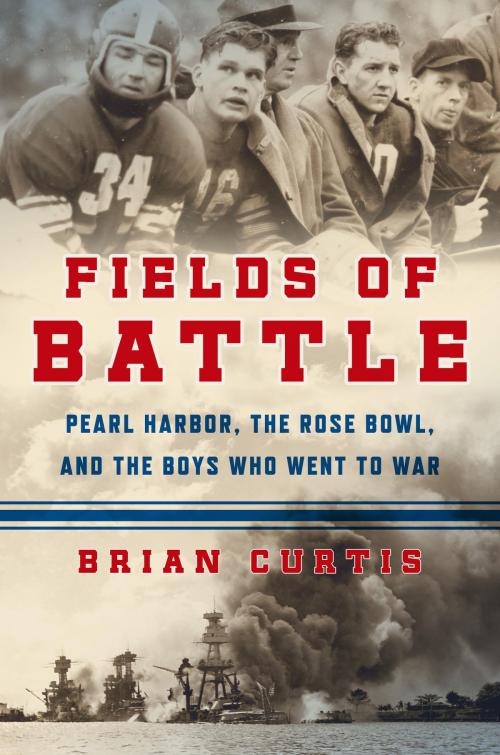Fields of Battle
Pearl Harbor, the Rose Bowl, and the Boys Who Went to War
Nonfiction, Sports, Football, History, Military, World War II| Author: | Brian Curtis | ISBN: | 9781250059604 |
| Publisher: | Flatiron Books | Publication: | September 27, 2016 |
| Imprint: | Flatiron Books | Language: | English |
| Author: | Brian Curtis |
| ISBN: | 9781250059604 |
| Publisher: | Flatiron Books |
| Publication: | September 27, 2016 |
| Imprint: | Flatiron Books |
| Language: | English |
In the wake of the bombing of Pearl Harbor, the 1942 Rose Bowl was moved from Pasadena to Durham, North Carolina, out of fear of Japanese attacks on the West Coast. It remains the only Rose Bowl game to ever be played outside of Pasadena. Duke University, led by legendary coach Wallace Wade Sr., faced off against underdog Oregon State College, with both teams preparing for a grueling fight on the football field while their thoughts wandered to the battlefields they would soon be on.
As the players and coaches prepared for the game, America was preparing for war. President Franklin D. Roosevelt and British Prime Minister Winston Churchill met to discuss the Allied strategy in Europe; a discussion that would change the lives of the boys and men on the field in Durham.
Finally, on New Year’s Day 1942, under dark gray skies and occasional rain, the two teams clashed on the gridiron in front of a crowd of 56,000, playing one of the most unforgettable games in history. Shortly afterward, many of the players and coaches entered the military and would quickly become brothers on the battlefield. Scattered around the globe, the lives of Rose Bowl participants would intersect in surprising ways, as they served in Iwo Jima and Normandy, Guadalcanal and the Battle of the Bulge. Four players from that Rose Bowl game would lose their lives, while many more were severely wounded. In one powerful encounter on the battlefield, OSC’s Frank Parker saved the life of Duke’s Charles Haynes as he lay dying on a hill in Italy. And one OSC player, Jack Yoshihara, a Japanese-American, never had the chance to play in the game or serve his country, as he was sent to an internment camp in Idaho.
In this riveting an emotional tale, Brian Curtis sheds light on a little-known slice of American history and captures in gripping detail an intimate account of the teamwork, grit, and determination that took place on both the football fields and the battlefields of World War II. It was a game created by infamy and a war fought by ordinary boys who did the extraordinary.
In the wake of the bombing of Pearl Harbor, the 1942 Rose Bowl was moved from Pasadena to Durham, North Carolina, out of fear of Japanese attacks on the West Coast. It remains the only Rose Bowl game to ever be played outside of Pasadena. Duke University, led by legendary coach Wallace Wade Sr., faced off against underdog Oregon State College, with both teams preparing for a grueling fight on the football field while their thoughts wandered to the battlefields they would soon be on.
As the players and coaches prepared for the game, America was preparing for war. President Franklin D. Roosevelt and British Prime Minister Winston Churchill met to discuss the Allied strategy in Europe; a discussion that would change the lives of the boys and men on the field in Durham.
Finally, on New Year’s Day 1942, under dark gray skies and occasional rain, the two teams clashed on the gridiron in front of a crowd of 56,000, playing one of the most unforgettable games in history. Shortly afterward, many of the players and coaches entered the military and would quickly become brothers on the battlefield. Scattered around the globe, the lives of Rose Bowl participants would intersect in surprising ways, as they served in Iwo Jima and Normandy, Guadalcanal and the Battle of the Bulge. Four players from that Rose Bowl game would lose their lives, while many more were severely wounded. In one powerful encounter on the battlefield, OSC’s Frank Parker saved the life of Duke’s Charles Haynes as he lay dying on a hill in Italy. And one OSC player, Jack Yoshihara, a Japanese-American, never had the chance to play in the game or serve his country, as he was sent to an internment camp in Idaho.
In this riveting an emotional tale, Brian Curtis sheds light on a little-known slice of American history and captures in gripping detail an intimate account of the teamwork, grit, and determination that took place on both the football fields and the battlefields of World War II. It was a game created by infamy and a war fought by ordinary boys who did the extraordinary.















